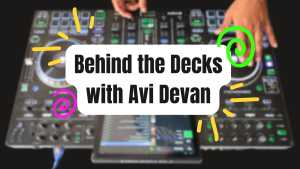Vocaloids: Trying but dying
Art of Kagamine Rin, from the song “Lost One’s Weeping” Nightcore version from Flickr.com. The original song was produced by Neru, and talks about mental health, and struggles during high school.
May 18, 2018
I will never forget how I felt when the virtual idol Hatsune Miku was on a “Kids React” video from the Fine Brothers. It was a strange combination of excitement and shame. This was because I was glad that “Vocaloids” were getting more popular and noticed, and appalled at the kids’ reactions at the same time. The kids mostly thought it was stupid and almost offensive because the singers are not real people. Needless to say, their lack of imagination was frightening. Which made my opinion of how important Vocaloids are even stronger.
“Vocaloids” are basically virtual singers. Originally, they were song making systems used by people who want to compose original songs, but once the company used a mascot, named Hatsune Miku, to promote the software, the character took off in popularity, taking the term with her. Soon after, many other iconic Vocaloids were created with different systems, like Kaito, Megurine Luka, Gumi and Kagamine Len and Rin. These new virtual performers gained a big following in the following years, and even were noticed by the public more. Huge hologram concerts were held, video games were made with the characters, Hatsune Miku even appeared on The Late Show with David Letterman. These times were probably the best for Vocaloid fans, even if the genre of Vocaloid was still considered to out of the ordinary. Now, it is a completely different story.
After surveying 103 students, I found that Vocaloid popularity has harshly decreased in Johnston High school. Only 6 percent of the students knew what “Vocaloids” were, and even less actually listened to their music. Kids have had varying responses towards the subject. “I wish more people would give the a try.” John Leimer ’18, said.
This is a bad thing that needs to be fixed because our creativity and our power in the entertainment industry are in danger. Vocaloids allow people to channel their musical creativity into something hands on, and also put a face to their work with whatever Vocaloid they choose to use or make. They let people be mainstream but unique at the same time. Artists these days do not always have full control over their music, unfortunately. With Vocaloid, a songwriter can have complete control and they can be as creative as they want. With out this kind of music in the public eye, people will only consume lazy and commercialized songs. “I personally like Vocaloid music, because it’s kind of more international and it reaches a larger audience.” Leimer said. “Through listening to Vocaloid music I can gain new appreciation for different languages and the cultures that surround them.”
“Vocaloids” losing popularity is also a bad thing, because the friendships that come out of the music will be lost. One of the great things about Vocaloid music is that creators can use them to talk about difficult topics, like abuse, addiction, traumatic events and many other personal things without sacrificing their identity if they are not comfortable with that. A majority of the current celebrities we have today, while they are still real people, their music and personalities feel fake. It is becoming hard to relate to people in the spotlight, while Vocaloids do not have this problem. Even though a real person is technically making the music, the way the songs are presented through an animated character changes more than one might think. An animated character is easier to project yourself onto, and the fact that you can make your own Vocaloid character to fit your style and personality even more makes it even more customizable. If you can not relate to the character itself, the subject matter will override that.
Many Vocaloid producers are ditching the scene because obscure music is so hard profit off of. With so many big names writing music that everyone will listen to, regardless of quality, new artists of every kind have it pretty tough. The producers, and fans that made Vocaloids big in the beginning are dwindling out in numbers. That’s not to say that new Vocaloid song writers are bad, it is just that the competition is overwhelming from other genres. People care about music artist drama, than music. People want songs that only talk about one night stands and drugs rather than life stories. Most of all, people do not want to put in the extra effort of using their imaginations in order to have a good time. When I was little, I did not need another person to play with to have fun. I could make up my own fun just by using my mind. We are slowly but surely losing this ability to be creative and resourceful.
In order to revive the “Vocaloid” genre, we need to start introducing new forms of music into the school. Choirs do a good job of including spirituals, gospels, and sacred music in concerts, but we can still take things further. I thnk we need to make use of more songs in different languages in choir to expose kids to more languages and generes of music. People these days are quick to dismiss music they are not used to, but sometimes they just need to be pushed in the right direction, and hear the right song for them. “I beleive it is possible for them to make a come back.” Leimer said. “Often times I’ve heard that Vocaloids are expensive products, so I think a good strategy for them to increase in popularity is to temporarily lower the price to encourage new creators and listeners to get on the platform.”





